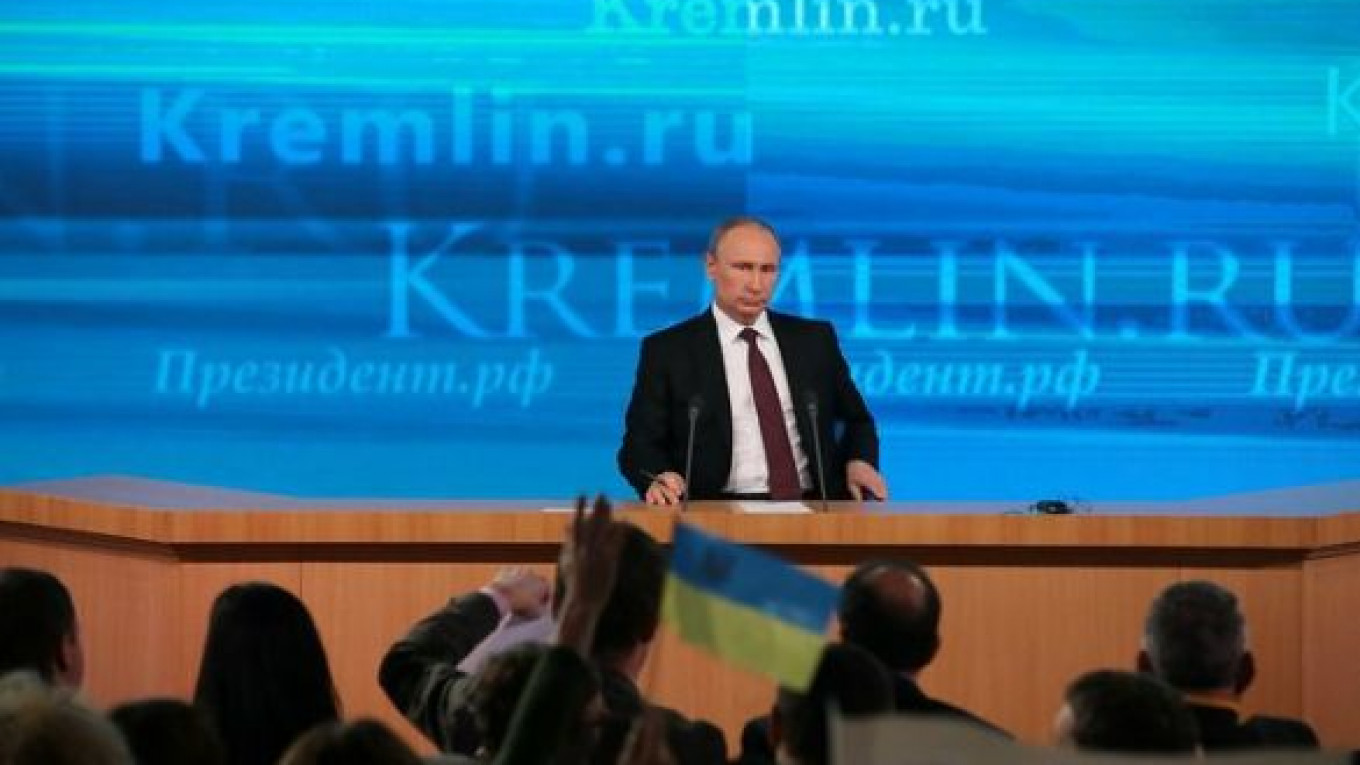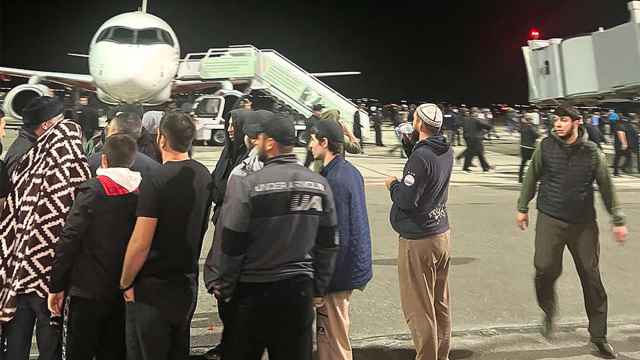President Vladimir Putin conducted his ninth major news conference today at Moscow's World Trade Center, an annual event during which he is bombarded with questions on Russia's policies and the government's plans for the future.
Moscow Times reporter Ivan Nechepurenko attended the news conference at the World Trade Center, while news reporter Gabrielle Tétrault-Farber followed developments from the newspaper's newsroom. Read the recap below.
4:19 p.m.: That's all from us for now. Make sure to read more coverage of the event later tonight on www.themoscowtimes.com.
4:12 p.m.: Putin leave the stage and wishes everyone a happy new year.
4:08 p.m.: A journalist from Bloomberg asked Putin about his efforts to prevent capital flight from Russia by insisting that Russian offshore companies pay taxes and withdrawing governmental support to Russian companies registered abroad.
“Government resources should serve Russia's national interest,” Putin said as the auditions clapped. “All countries in the world support de-offshorization. Governments need taxes to support their country. How can it be otherwise?”
4:07 p.m.: “Sorry, my dear,” Putin said to a disgruntled journalist whose question was not chosen.
3:51 p.m.: A reporter from Yekaterinburg asked Putin about the possibility of re-erecting a monument in honor of Felix Dzhezhinsky, the founder of the Cheka, the KGB's predecessor, and about monuments to Stalin in Russia. “This issue belongs to Moscow City government,” Putin answered. “From a liberal perspective, Stalin was a terrible dictator. But we need to respect every symbol of our history.”
“The Moscow authorities will decide where to erect monuments and in honor of whom. It is their right,” he said.
3:37 p.m.: A Los Angeles Times reporter reminded Putin that Russia had handed out Russian passports to South Ossetia residents before its war with Georgia in 2008 and pledged to protect Russians abroad. “Could Russia deploy Russian troops in Ukraine?” Putin answered that Russia was not going to stir trouble in Ukraine, reminding the reporter that the Russia's Black Sea fleet is still based out of the country.
3:34 p.m.: A Russian-speaking Estonian journalist asked Putin about the government measures to support Russians living in the former Soviet republics. “I said that the collapse of the Soviet Union was a tragedy of the 20th century,' Putin said. “I meant this on a very human level. Borders were erected between people.” Putin also said that many people in the former Soviet republics felt they belonged to Russia, even though they might not be ethnic Russians, and that Russia supports such individuals abroad.
3:29 p.m.: A journalist from the Siberian city of Kurgan questioned Putin about the inequalities in state spending between the different regions of Russia, and the possibilities of economic development in remote Russian regions. Putin answered that regional governors now have more and more instruments to contribute to their region's economy, and that they should actively work toward that goal.
3:25 p.m.: In response to a question about Russia's relationship with Iran, Putin answered, "Iran is our neighbor and one of our strategic partners in the region. We work together to normalize Israeli-Iranian relations." He said of the country's nuclear program, “Iran should have the right to develop its high technology. The international community should not put discriminative limits on it."
2:52 p.m.: A reporter from Reuters asked if Putin felt sorry for the two musicians from Pussy Riot who were jailed for two years for performing an anti-Putin song in Moscow's Christ the Savior Cathedral in February 2012. Putin replies that he was sorry that the punk rockers descended to such a state that they humiliated all women. “They crossed all the lines,” Putin said.
2:47 p.m.: Many of the questions are coming from pro-Kremlin journalists, and some appear to be embarrassing the Kremlin. Putin's spokesman Dmitry Peskov was caught with a face-palm while the teddy bear-carrying reporter from Sobesednik spoke with Putin. Image tweeted by Philipp Kireev.
Песков рыдает и фейспалмит во время вопроса девушки из "Собеседника" pic.twitter.com/jZxaxlHjWX
— Philipp Kireev (@mynameisphilipp) December 19, 2013
2:42 p.m.: A Vladivostok journalist just read Putin a poem that called for the re-nationalization of the energy industry and ended with the words: "If you do this, the entire country will thank you and ask you to rule for the rest of your life." The hall of journalists burst into applause.
Another teddy bear sighting at #Putin presser. "My bear joins me in wishing you a happy new year." pic.twitter.com/Tox4DRcXtH
— Kirit Radia (@KiritRadia) December 19, 2013
2:27 p.m.: A whimsical journalist from Sobesednik wished Putin a happy new year and success at the Olympic Games before inviting him to her office new year party.
The journalist also lamented newspapers' inability to compete with online media.
Putin said that the government's support for the media had decreased and agreed that Russia needed to think about ways to support its newspaper industry.
“Do you have children?” Putin asked. “Do you want to ask about subsidies for mothers?”
2:20 p.m.: Putin denied that Moscow Mayor Sergei Sobyanin had approached him for tips on how to lead his election campaign ahead of the September vote. But Putin conceded that someone who has "a real chance" would deserve his assistance.
2:15 p.m.: Here's an odd moment: A journalist from the Kuzbass region gave Putin a plush toy Bigfoot, who is the mascot of the region. RT state television captured the moment with the tweeted footage below:
Журналистка из Кузбасса подарила Владимиру Путину снежного человека - туристический талисман региона (ФОТО) pic.twitter.com/VUb7w8MjDu
— RT на русском (@RT_russian) December 19, 2013
2:05 p.m: Two hours on, Putin is still going strong at a news conference that was scheduled to last at least 90 minutes. No word yet on whether he hopes to challenge last years 4 1/2 hours. You can watch the event live here.
1:57 p.m.: A journalist from the independent television channel Dozhd asked Putin what political decisions he would take if Ukrainian-style mass protests were to happen on one of Russia's major squares.
Putin stressed that the state was responsible for maintaining order and that such events would need to remain within the limits of the law.
“People will say that Ukraine's European dreams was stolen,” Putin said. “I repeat that we have nothing to do with that.”
1:43 p.m.: A Georgian journalist asked what steps Russia was taking to normalize its relations with Georgia. Putin said he believed that a visa-free regime with Georgia would help develop economic and social ties between the two countries. Currently, citizens need a visa if they stay in the other country for more than 90 days.
Putin also said that Russia's relationship the new Georgian government has improved, but that the country's relations with the Georgian people have always been warm.
1:40 p.m.: Russian users are tweeting and re-tweeting a Lentu.ru joke Bingo card that takes a jab at Putin's news conference. Every square of the Bingo card contains a word that Putin is expected to use at the news conference — like "Russia," "blood," "Ukraine" and "order" — and users can cross out the words as Putin utters them.
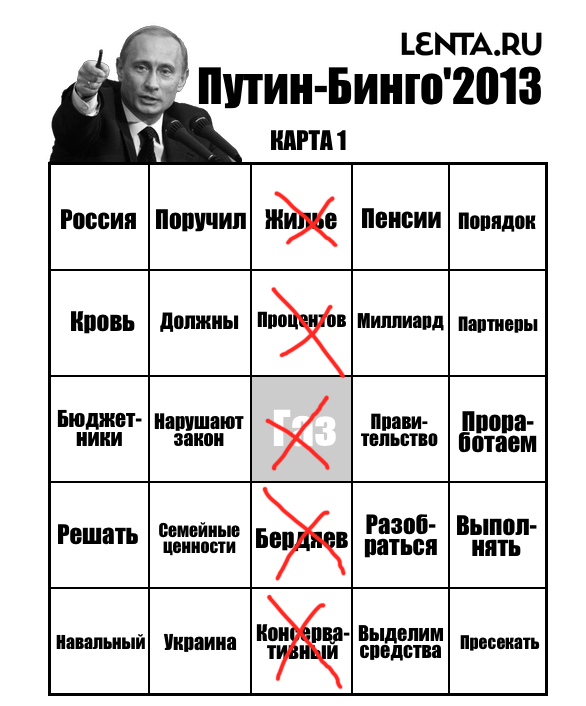
Lentu-ru's joke Bingo card reading, "Putin Bingo 2013" with words crossed off after Putin used them.
1:37 p.m.: “I believe Cossacks can sometimes be even more effective than standard law enforcement officers,” Putin admitted.
1:32 p.m.: When answering a question about Russia's efforts to protect the environment, Putin had harsh words for the Greenpeace crew of the Arctic Sunrise, who staged a protest near a Russia oil rig in Arctic waters.
“They come into our waters. Another ship ran into our coast guard. What is that? I don't call that productive dialogue on environmental issues,” he said.
But he added: “And they fall under the amnesty."
1:26 p.m.: Putin said the suspects arrested in connection with anti-Kremlin clashes on Bolotnaya Ploshchad on the eve of his inauguration last year do not deserve to be included in an amnesty approved by the State Duma on Wednesday. He said police needed some protections.
1:18 p.m.: A New York-based journalist from RTV asked Putin about his personal relations with U.S. President Barack Obama.
“I envy Obama because he can do what Snowden does" — spy on other countries, Putin said.
1:11 p.m: A blond radio show host, who advertised her station before addressing Putin, asked the president about his expectations about the success of Russian athletes at the 2014 Sochi Winter Olympic Games, which kick off in seven weeks.
Putin answered that Russia had high hopes for its atheletes, and that they were hoping to “make the fans happy.”
1:09 p.m.: A journalist from Rossia 1 television asked Putin whether he is acquainted with Edward Snowden, the former National Security Agency contractor who disclosed classified documents to the media.
He is not an uninteresting character to me,” Putin said. “He turned the heads of many people. But I have never worked with him.”
Adopting a fatherly tone, Putin questioned Snowden's life choices. “How is he going to live? Where is he going to live?”
Russia has given Snowden a one-year temporary refugee visa.
1:04 p.m.: A CNN journalist with shaky Russian skills asks Putin why religious values have become so important for him.
Putin says that certain groups within Russian society we agressively trying to impose their way of life and their values on the rest of the population. “We need to spend more time defending our traditional values,” Putin says. “Without these values, society degrades itself.”
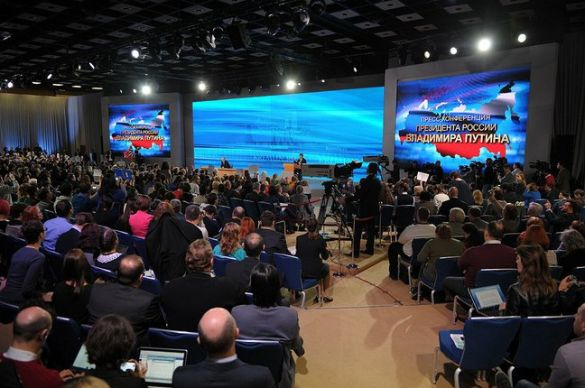
Hundreds of journalists listening to Putin at the president's annual news conference on Thursday. (kremlin.ru)
12:54 p.m.: Putin is unwilling to discuss his succession plan. “I won't say who's my successor,” Putin said, laughing. ”There's nothing to say right now.”
12:50 p.m.: Putin now names former Federation Council Speaker Sergei Mironov and Prime Minister Dmitry Medvedev as powerful politicians. Since Medvedev was Putin's chosen successor as president in 2008-12, Putin's decision today to name him almost as an afterthought is sure to raise eyebrows.
12:48 p.m.: A Komsomolskaya Pravda journalist is asking Putin whether he has chosen a successor yet, who is the No. 2 politician in the country. Putin first says Communist Party leader Gennady Zyuganov is the No. 2 politician. Then he names LDPR leader Vladimir Zhirinovsky.
12:37 p.m.: “Why has the West overreacted to Russia's deployment of weapons in Kaliningrad?” asked a journalist from the state-owned Channel One.
Putin says that Russia needs to respond to the U.S. anti-missile system, and this justifies Russia's military deployment on the European continent. He also says Russia has not deployed Iskander missiles in Kaliningrad.
12:41 p.m.: More than 20 protesters have been detained for trying to stage an unauthorized anti-Kremlin rally outside the venue where Putin is speaking, opposition leader Sergei Udaltsov says on Twitter.
12:39 p.m.: Putin was asked about the salaries of public servants. He replied, "мне хватит" — essentially, "I make enough; I don't need a raise."
The question came from a journalist from Argumenty i Fakty, who confronted Putin about the high salaries of Russia's top officials. Putin said that a bureaucrat's salary was linked to Russia's fight on corruption. A higher salary is seen as an effective method to prevent officials from taking bribes.
12:35 p.m.: The first question, from a journalist from Itogi magazine, asked Putin about the legitimacy of supporting Ukraine's economy. A second journalist, from a Ukrainian news agency, stood up and thanked Putin for starting the press conference with Ukraine. “I didn't start with Ukraine,” Putin answered, grinning.
That's true.
“It seems like we were here just yesterday,” Putin said in his first remarks to the crowd of 1,300 journalists gathered in a high-tech conference room at Moscow's World Trade Center.
Putin began by praising successes in the Russian economy and agriculture before answering any questions, as if he were telling journalists to "listen up" before they could take the floor.
Putin's press secretary, Dmitry Peskov, then chose the first two journalists who would have the honour to ask the president a question.
Like the audience of the U.S. game show "The Price is Right," journalists eagerly waved pieces of cardboard, notebooks, and even a small Ukrainian flag, to attract Peskov's attention.
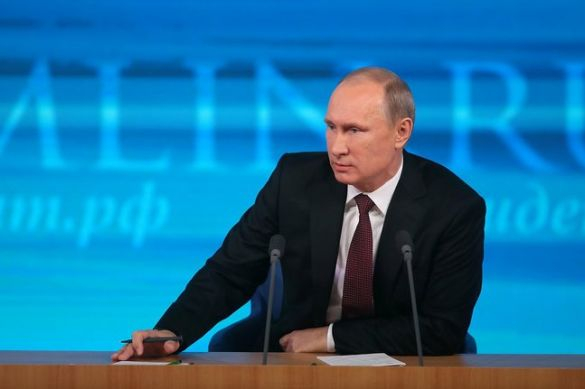
Putin fielding a question at the start of his news conference on Thursday. (kremlin.ru)
12:30 p.m.: Nataliya Vasilyeva, a reporter from The Associated Press, tweets: "Putin has been going on for 10 minutes about how Russia should protect the interests of the Ukrainian people. What about the Russian people?"
12:26 p.m.: Putin says he does not oppose the EU partnership deal that Ukraine recently snubbed. But, he says, Russia must take measures to protect its own economy.
12:18 p.m.: Putin defends his support of Ukraine, saying Russia is obliged to help because it is a "brotherly" nation.
12:14 p.m.: No surprise, perhaps. The first question directed at Putin, who is wearing a dark suit and red tie, is about the deal that he reached this week with Ukraine. Putin and Ukrainian President Viktor Yanukovych approved a raft of agreements Tuesday that saw Russia cut the price of gas supplies to Ukraine by a third and grant Kiev a much-needed $15 billion bailout.
12:10 p.m.: Putin has entered the hall and opened the news conference. Keeping to his style, he is a few minutes late. The event was supposed to start at noon sharp.
10:03 a.m.: About 1,300 journalists are accredited to attend today's , which follows Putin's Dec. 12 state-of-the-nation speech in honor of the 20th anniversary of the adoption of the country's Constitution.
"The president has demonstrated complete openness in dealing with journalists, and openness and generosity in terms of his time, which he has very little of," said Putin's spokesman Dmitry Peskov, Interfax reported.
Peskov also told Dozhd television that major announcements were not to be expected at this year's conference, and that there would most likely be many questions on Ukraine, Syria and the Russian economy.
The news conference is scheduled to last 90 minutes but has tended to exceed that time limit in the past.
In 2008, Putin answered 106 questions over the course of 4 hours and minutes. Last year, he answered 81 questions in 4 1/2 hours.
A Message from The Moscow Times:
Dear readers,
We are facing unprecedented challenges. Russia's Prosecutor General's Office has designated The Moscow Times as an "undesirable" organization, criminalizing our work and putting our staff at risk of prosecution. This follows our earlier unjust labeling as a "foreign agent."
These actions are direct attempts to silence independent journalism in Russia. The authorities claim our work "discredits the decisions of the Russian leadership." We see things differently: we strive to provide accurate, unbiased reporting on Russia.
We, the journalists of The Moscow Times, refuse to be silenced. But to continue our work, we need your help.
Your support, no matter how small, makes a world of difference. If you can, please support us monthly starting from just $2. It's quick to set up, and every contribution makes a significant impact.
By supporting The Moscow Times, you're defending open, independent journalism in the face of repression. Thank you for standing with us.
Remind me later.


